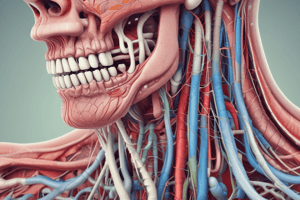Podcast
Questions and Answers
Which gland produces saliva containing amylase to begin the digestion of carbohydrates?
Which gland produces saliva containing amylase to begin the digestion of carbohydrates?
- Salivary Glands (correct)
- Gastric Glands
- Pancreas
- Liver
What is the primary role of gastric glands in the stomach?
What is the primary role of gastric glands in the stomach?
- Release digestive enzymes into the small intestine
- Produce bile for fat digestion
- Secrete hydrochloric acid to help digest proteins (correct)
- Secrete mucus to protect the stomach lining
In digestion, which gland produces bile to break down fats and maintain electrolyte balance?
In digestion, which gland produces bile to break down fats and maintain electrolyte balance?
- Intestinal Glands
- Liver (correct)
- Salivary Glands
- Pancreas
Where are the intestinal glands located and what do they secrete?
Where are the intestinal glands located and what do they secrete?
Which gland plays a crucial role in producing substances essential for digestion but is not strictly classified as a gland?
Which gland plays a crucial role in producing substances essential for digestion but is not strictly classified as a gland?
What substance do gastric glands produce to protect the stomach lining from acid damage?
What substance do gastric glands produce to protect the stomach lining from acid damage?
What is the primary function of the parotid gland in the digestive process?
What is the primary function of the parotid gland in the digestive process?
Which gland is responsible for producing hydrochloric acid and pepsin to aid in protein digestion?
Which gland is responsible for producing hydrochloric acid and pepsin to aid in protein digestion?
Apart from breaking down proteins, what other role does hydrochloric acid play in digestion?
Apart from breaking down proteins, what other role does hydrochloric acid play in digestion?
Which gland is responsible for producing insulin and glucagon in addition to digestive enzymes?
Which gland is responsible for producing insulin and glucagon in addition to digestive enzymes?
What is the function of Brunner's glands in the digestive system?
What is the function of Brunner's glands in the digestive system?
Which gland is involved in storing bile and releasing it into the small intestine to aid in fat digestion?
Which gland is involved in storing bile and releasing it into the small intestine to aid in fat digestion?
Flashcards are hidden until you start studying
Study Notes
Human Digestive Glands: An Overview
The human digestive system is a complex network of organs and glands that work together to break down food into nutrients our bodies can use. While the primary organs such as the stomach and intestines are well-known, it's crucial to understand the role of specialized glands that produce substances essential to digestion.
Salivary Glands
Salivary glands are located in the mouth and produce saliva, a fluid containing enzymes like amylase that begins the digestion of carbohydrates. Saliva also helps moisten and lubricate food, making it easier to swallow.
Gastric Glands
Gastric glands are found in the lining of the stomach wall. They secrete hydrochloric acid, which helps digest proteins and create an environment that supports the work of digestive enzymes produced by other glands. Gastric glands also produce mucus to protect the stomach lining from acid damage.
Liver
The liver is not strictly a gland, but it plays a pivotal role in digestion by producing bile, a fluid that breaks down fats and maintains the balance of electrolytes in the bloodstream. Bile is stored in the gallbladder until needed, then released into the small intestine to digest fats and aid in the absorption of nutrients.
Intestinal Glands
Intestinal glands are located in the lining of the small intestine and secrete mucus and digestive enzymes. The mucus protects the intestinal wall and helps move food through the intestinal tract. Intestinal glands also secrete peptidases enzymes that break down proteins.
Pancreas
The pancreas is a multifunctional organ that produces digestive enzymes and hormones. It secretes enzymes like proteases, lipases, and amylases, which help break down proteins, fats, and carbohydrates, respectively, aiding in the digestion and absorption of nutrients. The pancreas also produces insulin and glucagon, two hormones that regulate blood sugar levels.
The digestive glands are highly specialized, working together in a coordinated fashion to break down food into nutrients that the body can use. Each gland plays a critical role in this process, highlighting the intricate complexity of the human digestive system.
Studying That Suits You
Use AI to generate personalized quizzes and flashcards to suit your learning preferences.




